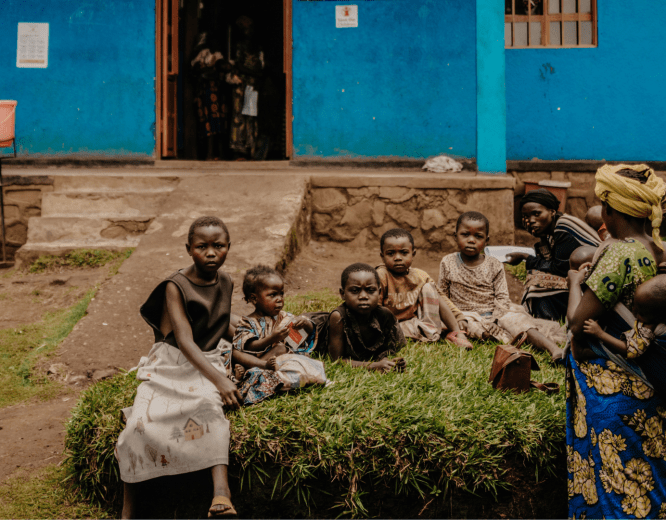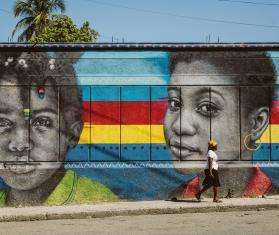Fighting between the Congolese armed forces and the armed group M23 has resumed in Lubero territory, eastern Democratic Republic of Congo (DRC), displacing people to the north and south of the front line as it draws closer to the town of Lubero.
Following emergency interventions in the area in 2023 and 2024, Doctors Without Borders/Médecins Sans Frontières (MSF) teams are once again intervening to support local health structures and provide basic supplies to displaced people.
Here, MSF emergency project coordinator Virginie Napolitano breaks down the situation and how MSF is responding.
What is the situation in the Grand Nord area of North Kivu province, particularly in Lubero territory?
There has been a lull throughout the territory since August 2024, following the ceasefire agreed upon on July 31, 2024, between DRC and Rwanda as part of the Luanda peace process. Despite frequent violations of this ceasefire by the parties to the conflict, the front lines remained stable. But in December, the clashes resumed, with greater intensity. Starting in the Luofu area, they spread southwards into Masisi territory and northwards into Lubero territory. Supported by Rwanda, the M23 armed group made rapid progress and expanded its territory, taking Alimbongo, on the outskirts of Lubero, in mid-December. Unfortunately, as is often the case, it is the civilian population that is paying the heaviest price.
Civilians are being forced to flee the combat zones in haste, leaving everything behind. This is the third wave of displacement in the area since the start of this year. Figures are approximate, but it is estimated that more than 290,000 people have been displaced throughout Lubero territory, including 70,000 in Lubero-Centre and 30,000 in Kipese.
In recent days, residents have had to leave areas close to the front lines at the request of the country's armed forces, in anticipation of further fighting. The bombardments are intense and are being carried out by all the militants; the Congolese army is also using helicopter gunships and fighter planes. The displacement of people comes on top of [previous displacements] linked to atrocities committed by the Allied Democratic Forces (ADF), an armed group affiliated to the Islamic State, which has been terrorizing the population for over 10 years.

How are local host communities being impacted and what does the future hold for displaced people?
Most displaced people are taken in by relatives and host families. Some, unfortunately isolated, are forced to take shelter in houses that are under construction or abandoned. Unlike other areas of North Kivu, such as around Goma, camps for internally displaced people are not common here. Members of the community open the doors of their homes to people who are displaced. Solidarity is the order of the day. The host families are already affected by the rise in prices and the disruption of the usual supply channels, which have been cut off by the front line. They share what little they have.
Some of the displaced people we met told us that there is not enough food and that they are suffering from the cold because Lubero has an altitude of almost 2,000 meters [more than 6,500 feet]. They say they lack mattresses and blankets and they sleep on the floor in the living rooms or kitchens of their hosts. Most of the displaced people are women and children; the men have often stayed behind to look after their belongings or seek a source of income.
Displaced people and host families all talk about their needs in terms of access to food and basic necessities, menstrual hygiene products for women, blankets, and kitchen items. The water supply system is [being stressed] by the influx of people, water points are struggling to meet needs, and there are not enough toilets.
Local health care is subject to a fee, which places an additional financial burden on host families. Patients resort to self-medication and traditional healers, which can lead to medical complications.

How is MSF responding to the situation in Lubero?
Initially, in collaboration with the Ministry of Health, MSF opened up access to primary health care for the entire population in two health centers, in Lubero-Cité and Kipese. We also cover the cost of hospitalization for children aged between one month and 15 years old. We support outpatient therapeutic nutrition programs [for malnutrition treatment] and those at Lubero General Hospital.
DR Congo: MSF responds after new M23 clashes
Read moreThe teams are also working to reinforce routine vaccination for all, an initiative of the Ministry of Health aiming to avoid epidemics, particularly measles. We have donated dressings and medicines, and are planning trainings on how to stabilize wounded patients before they are transferred to other facilities. The health centers close to the front line are closed, but care for the war-wounded is provided on the front line by military hospitals and the International Committee of the Red Cross (ICRC).
We are working to improve access to water in health facilities and in one of the few sites for displaced people, Magasin, which has around 300 households. Dealing with sexual violence is also one of our priorities, given the increase in the number of cases.

Conflict in DR Congo: What’s happening & how to help
Violence is escalating in eastern DR Congo, where the humanitarian needs are dire and rising. Here’s what to know.




